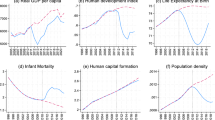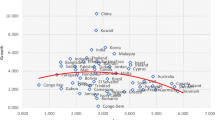Abstract
The Great Recession has severely hit the economies of most of the countries. Given that, fiscal policies have gained back a central role in the debate as a tool to recover from this situation. This paper provides an overview about the main controversial issues related to the fiscal policy. In particular, we analyze the role and the different effects played by discretionary counter-cyclical policies – say, for instance, tax cuts or increased government spending. Disagreement on this topic follows from the fact that it is extremely difficult to isolate the exogenous effect of these policies on GDP. We review several ways in which economists have tried to deal with this problem of estimation. Finally, we discuss why spending-based adjustments are preferable and less likely to be costly than tax-based ones and why large fiscal consolidation accompanied by appropriate policies can be much less costly than what we think.
Similar content being viewed by others
References
Alesina, A., & Giavazzi, F. (eds.) (2013) Fiscal Policy after the Great Depression. University of Chicago Press and NBER, forthcoming.
Barro, R., & Redlick C. J. (2011) Macroeconomic effects of government purchases and taxes. The Quarterly Journal of Economics, 126(1), 51–102.
Blanchard, O., & Perotti, R. (2002). An empirical characterization of the dynamic effects of changes in government spending and taxes on output. The Quarterly Journal of Economics, 117(4), 1329–68.
Brender, A., & Drazen, A. (2008). How do budget deficit and economic growth affect reelection prospects? Evidence from a large panel of countries. American Economic Review, 98(5), 2203–2220.
Perotti, R. (2012). Expectation and fiscal policy, an empirical investigation. Unpublished.
Ramey, V. (2011). Identifying government spending shocks: it is all in the timing. The Quarterly Journal of Economics, 126(1), 1–50.
Romer, C., & Romer, D. H. (2010). The macroeconomic effects of tax changes: estimates based on a new measure of fiscal shocks. American Economic Review, 100, 763–801.
Author information
Authors and Affiliations
Corresponding author
Additional information
Transcribed by Sara Hensel
April 26, 2012
Rights and permissions
About this article
Cite this article
Alesina, A. Fiscal Policy after the Great Recession. Atl Econ J 40, 429–435 (2012). https://doi.org/10.1007/s11293-012-9337-z
Published:
Issue Date:
DOI: https://doi.org/10.1007/s11293-012-9337-z




